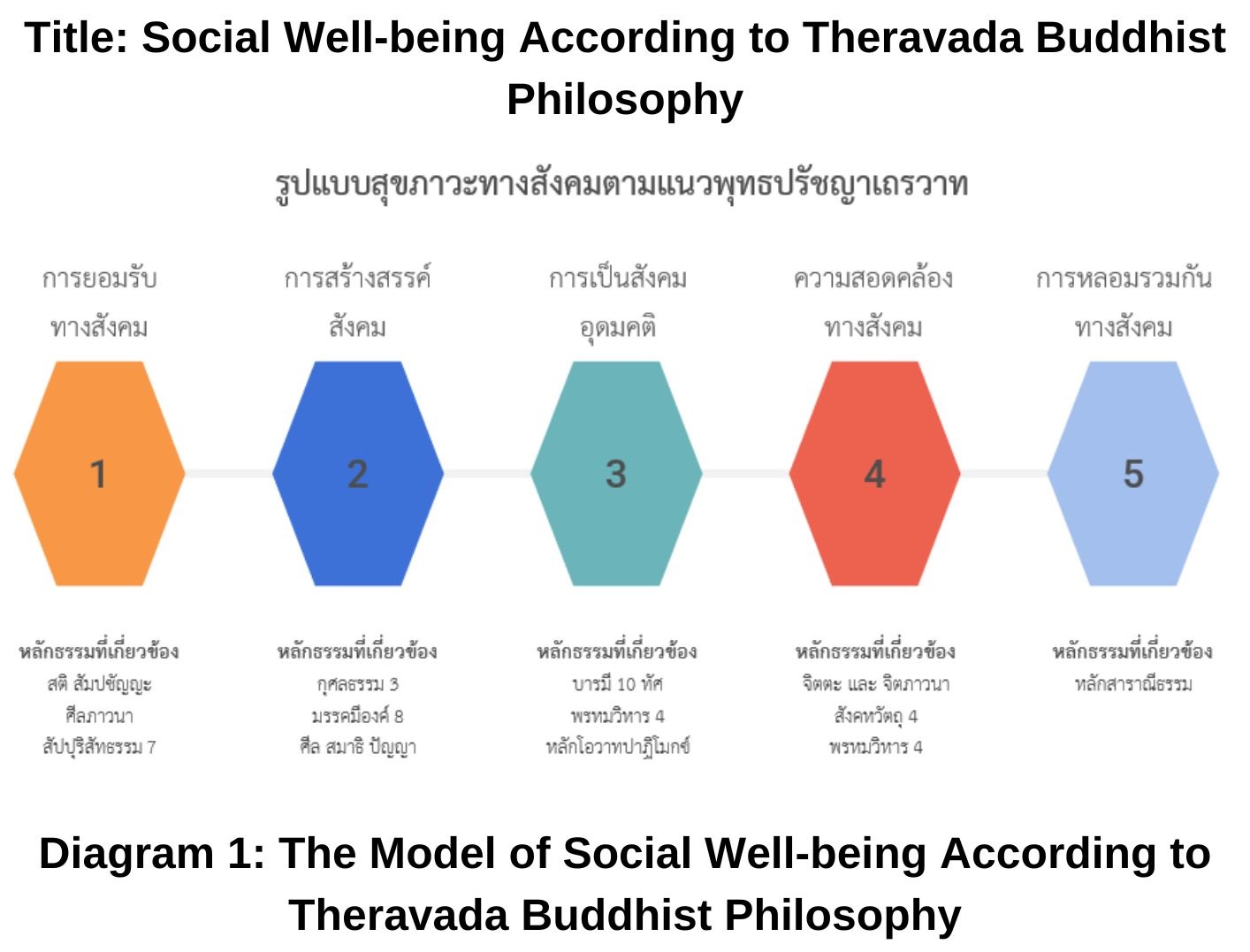Social Well-being According to Theravada Buddhist Philosophy
Keywords:
Well-being, Social Well-being, Theravada Buddhist PhilosophyAbstract
This research article is a qualitative study that employs document analysis with the objective of examining Social Well-being According to Theravada Buddhist Philosophy. The findings reveal that social well-being begins with awareness, which arises from the wisdom of self-reflection. This involves examining one's habitual behaviors and conduct to reflect on whether they lead to benefits or harm for oneself and others. Upon recognizing suffering, one practices acceptance to adapt and modify behaviors and conduct in ways that do not cause harm to oneself or others. The study suggests creating an environment conducive to the development of both physical and mental well-being. Through continuous self-cultivation, one becomes a positive influence on those around them—serving as a role model, a safe space, a source of compassion, and providing comfort and warmth to others in their presence or conversations. This leads to internal confidence and stability when working or engaging in activities together. Such a person becomes a wise and supportive friend who fosters beneficial knowledge for inner growth. They remain calm and unshaken when confronted with external disturbances, free from distractions, irritations, and fears. They live with mindful confidence and find happiness in the present moment. The principle truly contributes to the well-being of society. The new body of knowledge is the model of social well-being based on Theravada Buddhist philosophy, which consists of the following components: 1) Social Acceptance, 2) Social Contribution, 3) Social Actualization, 4) Social Coherence, and 5) Social Integration.
References
กีรติ บุญเจือ. (2551). คู่มือจริยศาสตร์ตามหลักวิชาการสากล. กรุงเทพฯ : ศูนย์ส่งเสริมและพัฒนาพลังแผ่นดินเชิงคุณธรรม.
ชิสา กันยาวิริยะ และเมธา หริมเทพาธิป. (2565). การศึกษาเชิงวิเคราะห์หลักภาวนา 4 ตามหลักพุทธปรัชญาเถรวาท. วารสารพุทธมัคค์, 7(2), 229-235.
ศิรินันท์ กิตติสุขสถิต และคณะ. (2555). คู่มือการวัดความสุขด้วยตนเอง HAPPINOMETER. กรุงเทพฯ :ธรรมดาเพลส.
สิริกุล กิตติมงคลชัย. (2562). การพัฒนามาตรวัดความสุขในการเรียนของนักเรียนมัธยมศึกษาตอนต้นในเขตกรุงเทพมหานคร. ปริญญาครุศาสตรมหาบัณฑิต. คณะครุศาสตร์ : จุฬาลงกรณ์มหาวิทยาลัย.
สิรินทร์ กันยาวิริยะ และชิสา กันยาวิริยะ. (2567). การสร้างสุขภาวะตามแนวพุทธปรัชญาเถรวาท. วารสารสถาบันพอดี, 1(5), 18-29.
อุเทน ลาพิงค์. (2561). การพัฒนาสุขภาวะทางสังคมของผู้สูงอายุ โดยใช้หลักสังคหวัตถุ 4 ในภาคเหนือ. วารสารวิชาการธรรมทรรศน์, 18(2), 233-243.
Boniwell, I. What is Eudaimonia? The Concept of Eudaimonic Well-Being and Happiness. [Online]. Retrieved from : http://positivepsychology.org.uk/pp-theory/eudaimonia/34-the-concept-of-eudaimonic-well-being.html [29 November 2023].
Brickman, P., & Campbell, D. T. (1971). Hedonic relativism and planning the good society. In M. H. Appley (Ed.), Adaptation level theory : A symposium (pp. 287-302). New York : Academic Press.
Carr, A. (2004). Positive psychology: New worlds for old. Irish Psychologist, 30(11), 278-279.
Csikszentmihalyi, M., Abuhamdeh, S., & Nakamura, J. (2005). Flow. In Handbook of competence and motivation. New York : The Guilford Press.
Diener, E., Sun, E. M., Lucas, R. E., & Smith, H. L. (1999). Subjective well-being : Three decades of progress. Psychological Bulletin, 125(2), 276.
Diener, Oishi, S., & Lucas, R. E. (2003). Personality, culture, and subjective well-being: Emotional and cognitive evaluations of life. Annual review of psychology, 54(1), 403-425.
Diener, Napa-Scollon, C. K., Oishi, S., Dzokoto, V., & Suh, E. M. (2009). Positivity and the construction of life satisfaction judgments: Global happiness is not the sum of its parts. Journal of Happiness Studies, 1(2), 159-176.
Hills, P., & Argyle, M. (2002). The Oxford Happiness Questionnaire : A compact scale for the measurement of psychological well-being. Personality and Individual Differences, 33(7) : 1073-1082.
Keyes, C. L. (1998). Social well-being. Social Psychology Quarterly, 61(2), 121–140.
Selim, S. (2008). Life satisfaction and happiness in Turkey. J Social Indicators Research, 88(3), 531-562.

Downloads
Published
How to Cite
Issue
Section
License
Copyright (c) 2024 Institute of Sufficiency Journal

This work is licensed under a Creative Commons Attribution-NonCommercial-NoDerivatives 4.0 International License.



